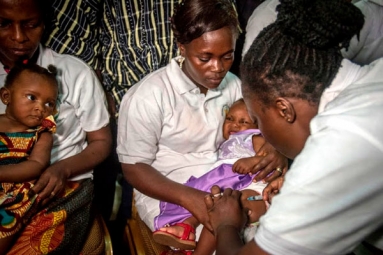
The varicella zoster vaccine to protect children against the common childhood disease known as chicken pox was approved for use in the United States in the early 1990s. It was tested in Japan in the 1970s, and in the United States during the 1980s in over 9,400 healthy children and 1,600 adults. The VZV is 70-90% effective in preventing chicken pox. If a vaccinated child does contract chicken pox, his or her case will be generally mild, with fewer skin lesions (15-30), a lower fever, and quicker recovery. Vaccinated children who get chicken pox are contagious, and can infect others with the disease. As of the mid-1990s, a booster for the VZV is not recommended, but studies were underway to determine how long immunity from the vaccine lasts.
Side effects. Most children experience only mild side effects from this vaccine. These include redness, tenderness, swelling, or a mild rash of several small pimples where the injection was given; tiredness, fussiness, mild fever, and nausea. The rash or pimples may also appear elsewhere on the body, and can occur up to one month after the injection was given. The VZV can be given at the same time as other recommended childhood vaccines, including DTP, polio, hepatitis B, and Haemophilus influenzae type B. It can also be given at the same time as the MMR vaccine. If the VZV and MMR are not given together, however, there should be at least a one-month interval between the two vaccines.
Other vaccines may be recommended for specific situations, and the pediatrician's advice should be sought and followed. Travel to tropical countries may require immunization for one or more diseases, such as cholera, typhoid fever, and yellow fever. Side effects from these vaccines are more severe than for the routine immunizations of childhood, and must be weighed against the necessity of the travel. Certain children with special needs may also be given the vaccines against influenza, pneumoccus, and rabies.
source : yahoo! health








